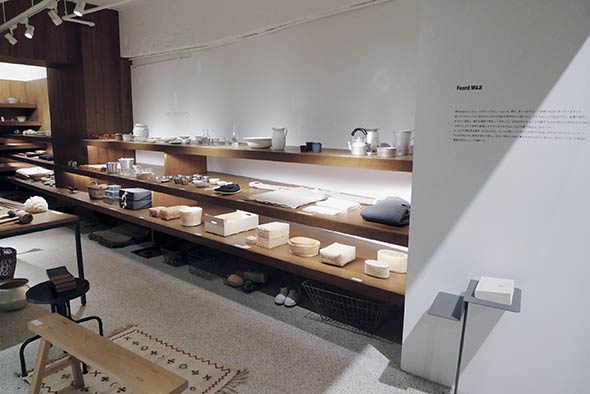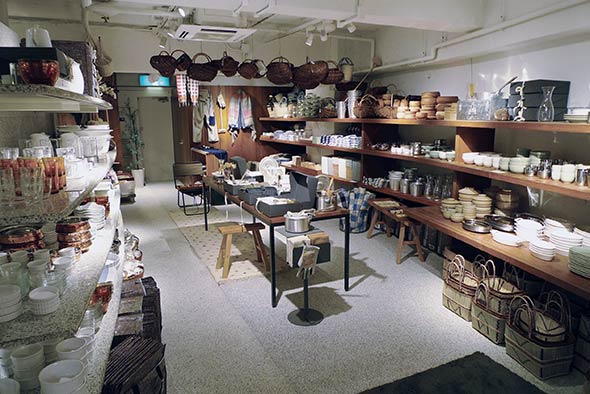Creative director Kenya Hara and product designer Naoto Fukusawa come together to design well thought out contemporary homeware. Quality meets simplicity in this brand new concept


Since setting up shop in SoHo back in 2007, MUJI is a brand that many will be familiar with—modern furniture, simple lifestyle goods and everyday essentials. But with a rich history of more than 30 years, there’s much more to MUJI than we think. Established in Japan in 1980 with a range of only 40 products, MUJI stores can now be found in most major cities throughout Europe and Asia, offering household goods, clothing, food, and cosmetics. With a company philosophy of “No Brand Quality Goods,” it is easy to label MUJI as the ‘Japanese IKEA.’ However, the set of ethics and traditions upon which it is based translates into beautifully designed, well-manufactured products at reasonable prices. MUJI is now somewhat of a national institution in Japan, with its products being found in the majority of homes and businesses across the country. And with such a loyal following, they take immense pride in their relationships with customers, not only in their native country but also around the world. Through their “Quality Producers for Everyday Life Research Center” project, customers are given a platform to share their ideas and opinions of MUJI goods, which are then communicated to the Tokyo HQ and discussed in weekly meetings. This connection with customers is key to their success in Japan, a country where honesty and communication are of the utmost importance.
Another major factor in MUJI’s sparkling reputation is their approach to the environment and society as a whole. MUJI aims to “work in harmony with our planet,” and this is apparent from their choice of materials, manufacturing processes, waste elimination, and support of fair trade. Their environmentally friendly and it socially conscious approach has been present from the start, and seems to have increased since the March 2011 earthquake and tsunami in Japan, with the introduction of a series of new initiatives that work to signify the importance of life.
After a long-standing admiration of MUJI, we at SOMA were honored to be invited to one of Japan’s most eagerly anticipated events of the year, the grand opening of Found MUJI’s new concept store in the heart of the über-hip Aoyama neighborhood in Tokyo. The event began with an exhibition of Spring/Summer 2012 products, showcasing the best of their vast inventory to the world’s media. Four floors displayed their innovative electronics, no-frills apparel and accessories, modern homeware, and delectable foods. The showpiece of the exhibition was of course MUJI’s brand new concept, Found MUJI. The idea for Found MUJI began in 2003, when daily essential items from around the world were sought out and collected by a team of designers and subsequently MUJI-fied—transformed and regenerated to fit the MUJI aesthetic, then produced in limited numbers for sale within Japan. Standout items have included traditional stainless steel bowls from India, and a string-fastening storage file and rather peculiar personal steam inhaler, both from France.
The afternoon was then spent with members of the board – including company president Masaaki Kanai, and creative director Kenya Hara, and product designer Naoto Fukasawa – who gave an insightful glimpse into the world of MUJI over a delightful lunch at Meal, the company’s stylish and cozy café. After lunch we headed to the small yet impressive Found MUJI concept store for the opening ceremony. Set in a refurbished version of what was MUJI’s first-ever store, we beheld two floors of assorted items that had the feel of a neighborhood jumble sale, high-end art exhibition, and history museum rolled into one—some
truly intriguing products presented in a well-planned, gallery-like setting.
The party kicked into high gear later in the evening, after a host of Tokyo’s movers and shakers made their way back to Meal for a night of celebration, cocktails, and canapés. The perfect ending to a fantastic day.
Luckily for us, will see MUJI’s long-awaited debut on the West Coast in the near future, with plans to open their first store in San Francisco—a wise move, considering that more than 25% of their online sales in the US and Canada come from the West. It is safe to say that San Francisco will be the first of many locations on the West Coast, as esteemed creative director Kenya Hara explains, “MUJI is like water, we flow naturally into people’s lives.” It seems that it won’t be long before everybody’s life has been splashed by a little MUJI charm.
Top picks for Spring/Summer 2012
MUJI presented an impressive range of new products from their S/S 2012 line-up, and after careful thought, we selected our
three favorites.*
LABO – In collaboration with British fashion designer Margaret Howell (ANGLOBAL Ltd.), the LABO apparel collection is based on keywords such as “straightforward,” “wearable,” and “unpretentious,” and that’s exactly what it is. Using 100% organic materials and simplified shapes, patterns, and colors, the outcome is perfect; a range of apparel for both men and women that is stylish and easy to wear.
Bamboo Dining Furniture – Made using Japan’s traditional raw material, these dining tables and chairs promote a rich heritage as well as providing a surprising amount of comfort, with the bamboo chairs flexing and bending to suit the user’s natural seating position.
Schedule App – iPad users that own a MUJI schedule book can import their monthly schedules by simply photographing specific pages. The image, including the user’s handwriting, is then transferred into a digital format and displayed clearly on the MUJI iPad app. Perfect for organizing your hectic schedules.
*Some products from the S/S 2012 may not be available in the USA yet.
TEXT BY Mike Burns
PHOTOGRAPHY BY Jeroen van Oirschot

